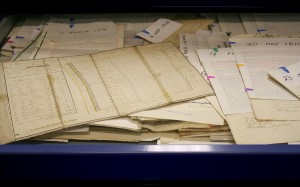What are archives?
Wexford County Archive is the official repository in the county for the archives and records of Wexford Local Authorities and for local private collections. An archivist was appointed by Wexford County Council in 2002 in line with the Council’s statutory obligations under Section 65 of the Local Government Act, 1994 to make arrangements for the proper management, custody, care and conservation of local records and local archives and for inspection by the public of local archives (since superseded by Section 80 of the Local Government Act, 2001).

Equipped to BS5454 standards
The legislation also requires local authorities to retain and manage their current and non-current records and provide suitable premises and facilities for their custody and care. The archivist addresses these requirements through the implementation of a records management system to ensure effective record-keeping and administrative efficiency. The archive shared premises in Ardcavan with the administrative headquarters of the county library service until September 2011, when the latter service was transferred to the new county council complex at Carricklawn. The centre at 6A Ardcavan Business Park is now dedicated to the county archive and is equipped to BS5454 standards with regard to storage and collections care. The building also houses a records centre for the non-current records of Wexford Local Authorities and operates a file retrieval service to local authority staff.
Records of long term value
In the course of daily life, individuals and organisations create and retain information about their personal and business activities. Examples include the archives of a local authority, business, solicitor’s firm, school, landed estate, society or club. The records generated provide an insight into the workings of an organisation, the decisions it took and the impact of outside influences on its development. Archives are the accumulated records of an organisation or of an individual that are worthy of permanent preservation because of their long-term value – to their creator and/or to researchers.
Archives comprise many forms
While the most common medium for archives is paper, animal skins were traditionally used (e.g. parchment and vellum). Other media include photographs; maps, plans and drawings; audio and visual media; microfilm and microfiche; electronic records.
Archives comprise many forms, including:
- Bound volumes
- Photographs
- Diaries
- Files
- Letters
- Literary manuscripts
- Maps, plans and drawings
- Deeds and rentals
- Postcards
All these records contribute to the cultural and historical memory of our community. They are preserved and made available for research purposes.
Archive uses
Archives and the information they contain can be used in a variety of ways, including:
- as primary source materials for historians, local and family researchers and for primary, post-primary and third level students
- as an information resource for the staff and members of Wexford Local Authorities
- in the induction training of staff and visitors to Wexford Local Authorities
- as a means of educating the general public (and potential first-time users of the service) through use of exhibitions, displays, talks and workshops
- in publications, contributions to journals and in-house brochures
- to mark commemorative events on a local and national level, e.g. centenary celebrations of local government in Ireland (1999); decade of commemorations in Ireland (2011-21)